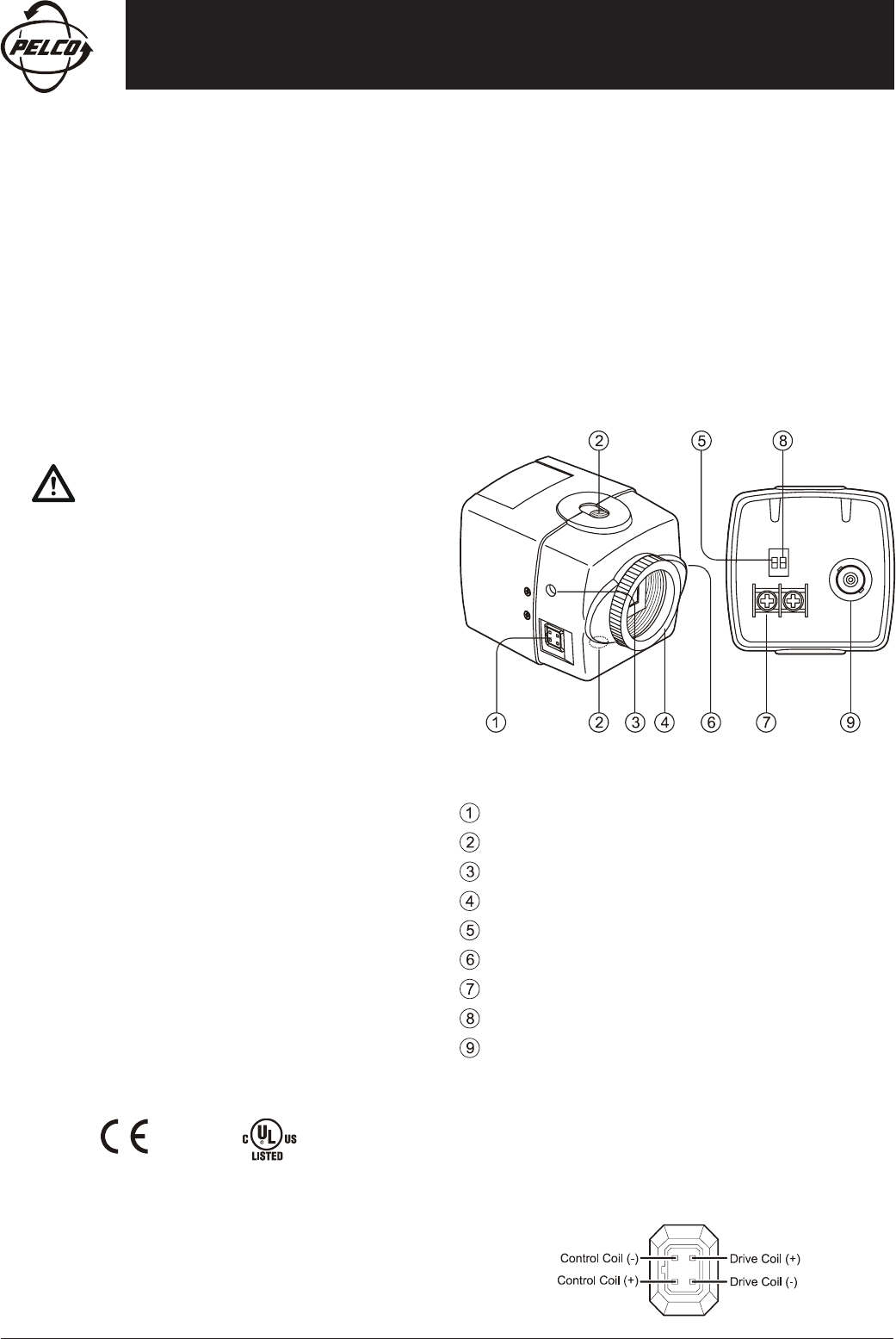
CCC2400/MCC2400 SERIES COMPACT CAMERAS
INSTALLATION/OPERATION
IMPORTANT SAFEGUARDS AND WARNINGS
Prior to installation and use of the product, the following WARNINGS
should be observed.
1. Installation and servicing should be done only by qualified service
personnel and conform to all local codes.
2. Power camera only from a UL Listed, Class 2 isolated power supply.
3. Do not touch the image surface of the sensor. If the sensor is
accidentally touched, clean it only with isopropanol.
4. Do not expose the camera sensor to very bright light over a long
period of time as this may damage the CCD. The camera and lens
setup must be correct to avoid continual overexposure to bright light.
A lens with an automatic iris is recommended under these conditions.
5. Before installing the lens, make sure that its back will not touch the
CCD sensor or associated components when it is screwed into the
camera.
6. For outdoor use, an appropriate protective housing conforming to
IP65 or UL50 or better must be used.
REGULATORY NOTICES
This device complies with part 15 of the FCC Rules. Operation is subject
to the following two conditions: (1) This device may not cause harmful
interference, and (2) this device must accept any interference received,
including interference that may cause undesired operation.
This equipment has been tested and found to comply with the limits of a
Class B digital device, pursuant to part 15 of the FCC rules. These limits
are designed to provide reasonable protection against harmful
interference in a residential installation. This equipment generates, uses,
and can radiate radio frequency energy and, if not installed and used in
accordance with the instructions, may cause harmful interference to
radio communications. However there is no guarantee that the
interference will not occur in a particular installation. If this equipment
does cause harmful interference to radio or television reception, which
can be determined by turning the equipment off and on, the user is
encouraged to try and correct the interference by one or more of the
following measures:
Reorient or relocate the receiving antenna.
Increase the separation between the equipment and the receiver.
Connect the equipment into an outlet on a circuit different from that to
which the receiver is connected.
Consult the dealer or an experienced radio/TV technician for help.
Any changes or modifications not expressly approved by the party
responsible for compliance could void the users authority to operate
the equipment.
This Class B digital apparatus complies with Canadian ICES-003.
Cet appareil numérique de la classe B est conforme à la norme NMB-003
du Canada.
DESCRIPTION
The CCC2400 Series and the MCC2400 Series comprise color or
monochrome cameras with 1/3-inch CCD imagers and a direct drive
lens connector. All cameras accept CS lenses; C lenses can be used
but require Pelcos PCMA40 C-mount adapter. Color cameras have digital
signal processing (DSP) and auto white balance.
MODELS
CCC2400S-4 Standard resolution (330 TV lines) color camera, 1.0 lux
at f1.2, NTSC
CCC2400S-4X Standard resolution (330 TV lines) color camera, 1.0 lux
at f1.2, PAL
CCC2400H-4 High resolution (470 TV lines) color camera, 1.2 lux at
f1.2, NTSC
CCC2400H-4X High resolution (470 TV lines) color camera, 1.2 lux at
f1.2, PAL
MCC2400S-4 Standard resolution (380 TV lines) monochrome camera,
0.1 lux at f1.2, EIA
MCC2400S-4X Standard resolution (380 TV lines) monochrome camera,
0.1 lux at f1.2, CCIR
CAMERA LAYOUT
Refer to Figure 1.
Figure 1. Location of Parts
Auto Iris Lens Connector (DC drive only)
Camera Mounts
Lens Level Adjustment
Lens Mount/Back Focus Adjustment Ring
Electronic Shutter Control (ESC) Switch
Back Focus Locking Screw (on the side of the camera)
Power Input Terminals
Backlight Compensation Switch
Video Output Connector
INSTALLATION
1. The camera accepts a CS-mount lens with a fixed iris, manual iris, or
direct drive auto iris. A C-mount lens can be used but requires Pelcos
PCMA40 C-mount adapter. Screw the lens into the camera. For a
direct drive auto iris lens, connect the four-pin plug to the auto iris
lens connector on the camera.
AUTO IRIS LENS CONNECTOR
The maximum load must not exceed 50 mA
